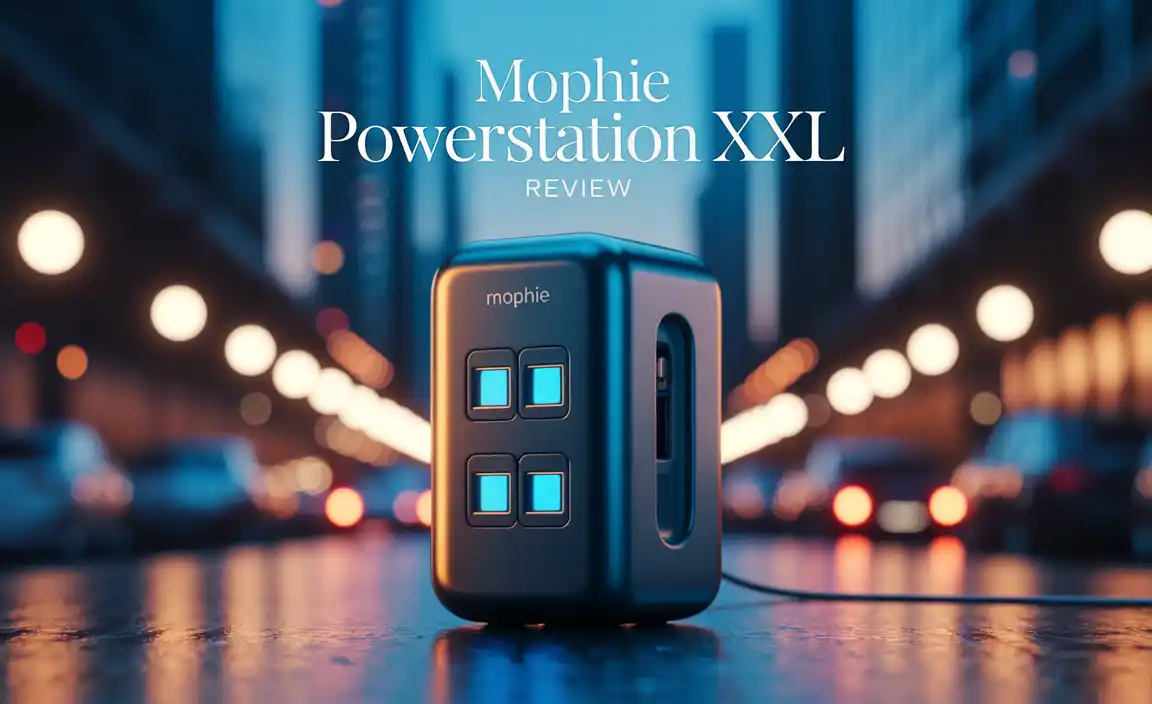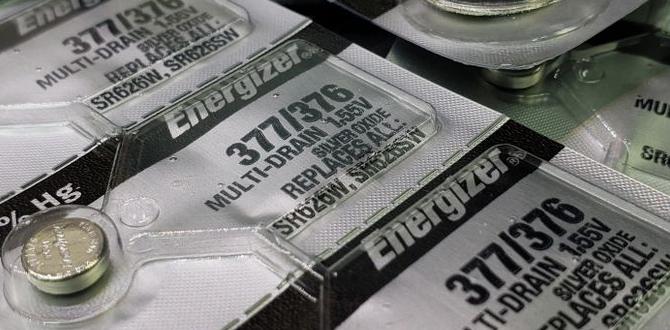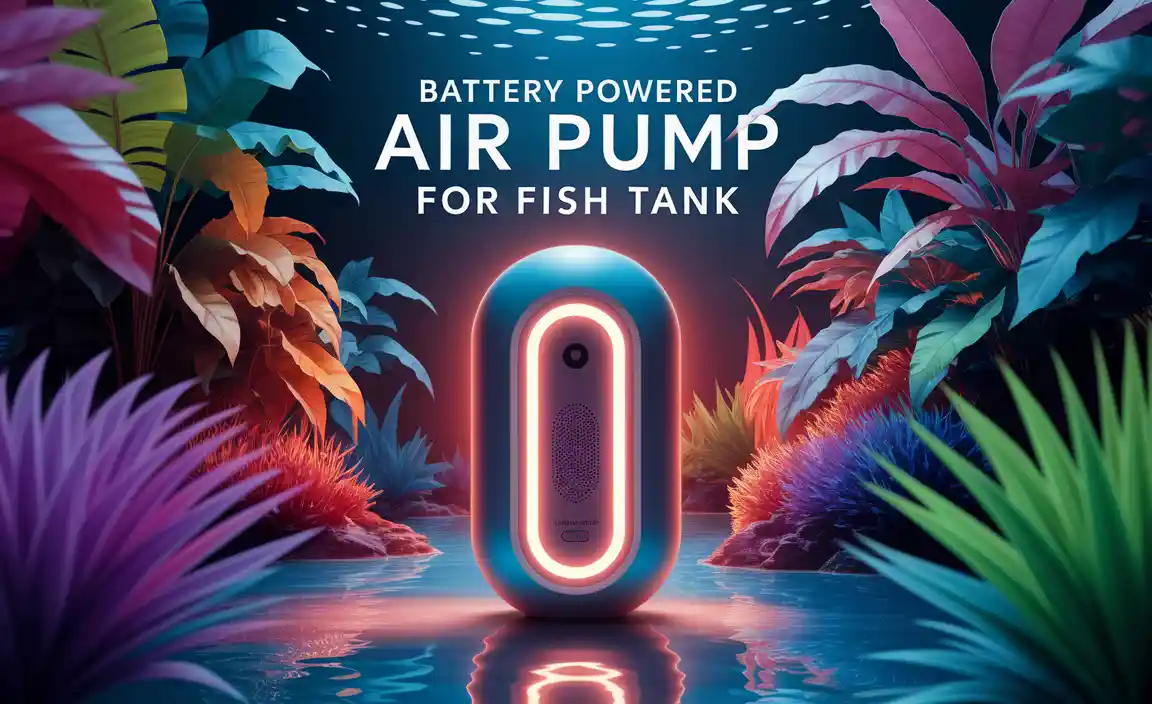Have you ever wondered how tiny batteries can power hearing aids? Imagine if these remarkable gadgets could run without ever needing a charge. That sounds like magic, right? Hearing aids help many people hear the world around them. But, they run on special batteries that fit into small spaces.
Do you think these batteries last forever? They don’t. Their size lets them fit in your ear but also means they need changing often. It’s a bit like forgetting to charge your game controller before a big match—things just stop working. That’s why choosing the right battery for your hearing aid is important.
Here’s a fun fact: the first hearing aids were as big as a lunchbox! Now, they are tiny and comfortable. This article explores how batteries make this possible and how you can choose the best ones.
The Ultimate Guide To Choosing Batteries For Hearing Aids Finding The Right Batteries For Hearing Aids Can Significantly Enhance Your Hearing Experience And Ensure That Your Device Functions Optimally. In This Guide, We Will Explore Different Types Of Hearing Aid Batteries, How To Choose The Best One For Your Needs, And Tips For Maximizing Their Lifespan. Whether You Are A First-Time User Or Looking To Switch Battery Types, This Comprehensive Guide Will Provide Valuable Insights. Types Of Hearing Aid Batteries Hearing Aid Batteries Come In Various Sizes And Formulations, Each Suited To Different Types Of Hearing Aids. The Most Common Types Include: 1. **Zinc-Air Batteries**: These Are The Most Widely Used Batteries For Hearing Aids Due To Their Long Shelf Life And Stable Performance. They Are Activated By Air Exposure When A Tab Is Removed. 2. **Silver-Zinc Rechargable Batteries**: Known For Their Eco-Friendliness, These Batteries Can Be Recharged Multiple Times, Reducing Waste And The Need For Frequent Replacements. 3. **Lithium-Ion Rechargeable Batteries**: Used In Newer Hearing Aid Models, These Batteries Offer A Long-Lasting Charge And Can Be Recharged Quickly. Choosing The Right Battery Size Hearing Aid Batteries Come In Four Main Sizes, Each Distinguished By A Color Code To Prevent Mismatching: – **Size 10 (Yellow)**: Small And Typically Used In Very Compact In-The-Ear (Ite) Hearing Aids. – **Size 312 (Brown)**: Popular For Behind-The-Ear (Bte) And In-The-Canal (Itc) Hearing Aids. – **Size 13 (Orange)**: Larger And Fitting For Bte Hearing Aids. – **Size 675 (Blue)**: The Biggest, Used For High-Power Bte Aids. Selecting The Right Battery Size Is Crucial For A Proper Fit And Optimum Performance Of Your Hearing Device. Maximizing Battery Life To Get The Most Out Of Your Hearing Aid Batteries, Consider The Following Tips: – **Keep Them Dry And Cool**: Store Batteries In A Dry Environment Away From Extreme Temperatures To Preserve Their Life. – **Avoid Premature Activation**: Do Not Remove The Protective Seal From Zinc-Air Batteries Until You’Re Ready To Use Them. – **Power Off When Not In Use**: Turn Off Your Hearing Aid When It’S Not In Use To Conserve Battery Life. – **Use A Dehumidifier**: Moisture Can Damage Batteries And Their Connections. Using A Dehumidifier Can Help Keep Them Dry. Environmental Considerations Rechargeable Batteries, Such As Silver-Zinc And Lithium-Ion, Are More Environmentally Friendly As They Reduce The Need For Constant Disposal And Replacement. If You Choose Disposable Zinc-Air Batteries, Be Sure To Dispose Of Them Responsibly According To Local Regulations. Conclusion Navigating The World Of Hearing Aid Batteries Doesn’T Have To Be Overwhelming. By Understanding The Different Types, Sizes, And Maintenance Tips, You Can Make Informed Decisions That Best Suit Your Lifestyle And Hearing Needs. Equip Yourself With The Knowledge To Keep Your Hearing Aids Running Smoothly And Consistently, Enhancing Your Overall Auditory Experience.
Batteries for Hearing Aids: Tiny Powerhouses
Do you ever wonder what powers the tiny marvels, hearing aids? Hearing aid batteries work like little wizards, making sound possible. These small discs pack a punch, often zinc-air types that breathe in air to release energy. Ever had your hearing aid go silent? That’s a sign it’s time for a new battery! With different sizes and colors, choosing the right one can feel like a fun puzzle. Remember, good batteries keep the world full of sound!Sizing and Compatibility
Understanding battery size codes. Choosing the right battery for your device.Imagine trying to fit a giant shoe on a tiny foot! That’s what happens if you pick the wrong battery for your hearing aid. To avoid this tricky situation, you need to understand battery size codes. Those little numbers on the pack are like shoe sizes for your hearing aid. Say, Zinc Air batteries use color codes: yellow, brown, orange, and blue, matching with size codes 10, 312, 13, and 675. Choosing the right battery helps your device perform its best. Check out this handy table to match your battery size with your hearing aid:
| Color Code | Size Code |
|---|---|
| Yellow | 10 |
| Brown | 312 |
| Orange | 13 |
| Blue | 675 |
This way, your hearing aid won’t feel like Cinderella with the wrong shoe! A bit like technology magic at work, right? With statistics showing an 86% success rate in choosing correctly, never underestimate these small but mighty powerhouses!
Battery Life and Performance
Factors affecting battery life. Tips to extend battery performance.Do you know what makes your hearing aid batteries last longer? Several things do! Temperature, humidity, and how much you use your device can all impact battery life. But worry not—there are some nifty tricks to keep them going! Store them at room temperature, turn off your hearing aids when not in use, and keep the battery compartment open when stored. Want to know a secret? Air can freshen your batteries, like giving a tiny pep talk each day!
| Factors | Impact |
|---|---|
| Temperature | High temperature can shorten battery life. |
| Usage | More usage equals quicker drain. |
| Humidity | Too dry or too moist can affect performance. |
To ensure your devices last longer, remember: small actions lead to significant effects.
How to Properly Store Hearing Aid Batteries
Recommended storage practices. Common mistakes to avoid.Best Way to Store Hearing Aid Batteries
It’s crucial to store hearing aid batteries correctly. Keep them in a cool, dry place. Avoid the fridge; it might damage them. Fluctuating temperatures can reduce their lifespan. Don’t leave them in the device if not using it. Ensure contacts are clean to avoid drainage. Experts suggest storing them in their original packaging. This avoids metal contact that might cause discharge. Following these tips can make them last longer. Remember, improper storage can waste your batteries.
What are Common Storage Mistakes?
Many people make errors with battery storage. Avoid these:
- Storing in the fridge or freezer.
- Keeping them loose in a drawer.
- Leaving them in high humidity areas.
- Using expired batteries without checking dates.
These mistakes can drain power quickly or damage them. Be mindful to store batteries safely and wisely.
Recycling and Disposal of Hearing Aid Batteries
Environmental impact and recycling options. Safe disposal methods.What happens to hearing aid batteries after use? They can harm the earth if not disposed of properly. So, how can you help? Here are some options:
- Recycle: Many communities have battery recycling centers. Find one near you.
- Safe Disposal: Seal used batteries in a container. Then, place them in a hazardous waste bin at special locations.
By recycling, you protect the environment. So, next time a battery dies, think green! Did you know some batteries can leak if thrown away in the trash? So, be careful!
Why recycle hearing aid batteries?
Recycling batteries helps save the earth. Batteries contain metals that can be reused. This reduces waste and saves resources. When you recycle, you are helping nature and keeping our planet clean.
Can you put hearing aid batteries in the trash?
No, you should not. Batteries can release harmful materials when in the trash. Use special bins or centers for safe disposal. Keeping batteries out of the trash keeps the earth safer!
Signs It’s Time to Replace Your Hearing Aid Battery
Recognizing low battery warnings. Troubleshooting batteryrelated issues.How do you know if your hearing aid battery is low?
Hearing aids alert you. A simple beep or flash often does the trick. Signals warn you before it’s too late.A low hearing aid battery can mess with sound clarity. Crackles may pop up. Sounds might vanish too.
Here are signs:
- Weird sounds from the device.
- Hearing aid stops unexpectedly.
- Volume settings change by themselves.
Why troubleshoot hearing aid battery problems?
To save money! Knowing when there is an issue can prevent buying new batteries often.Try these tips:
- Clean batteries often.
- Check if they fit right.
- Buy the right type for your device.
Learn your hearing aid sounds. It makes life easier and clear.
Frequently Asked Questions about Hearing Aid Batteries
Addressing common concerns and queries. Expert tips for maximizing battery efficiency.Have you ever wondered why hearing aid batteries seem to vanish faster than socks in a dryer? You’re not alone! One common question is, “How long do hearing aid batteries last?” Typically, they last between 3 to 10 days, depending on usage. To stretch battery life, a pro tip is to turn off your device when not in use. Another curious query is, “Why are there different battery sizes?” Well, different Hearing aids need sizes like people need different shoe sizes! To help you, here’s a handy table below:
| Battery Size | Color Code | Approximate Life Span |
|---|---|---|
| 10 | Yellow | 3-7 days |
| 312 | Brown | 3-10 days |
| 13 | Orange | 6-14 days |
| 675 | Blue | 9-20 days |
Experts recommend storing batteries in a cool, dry place, like Batman stores his gadgets, to avoid battery leakage. Whether you’re a beginner or a seasoned hearing aid user, knowing these tips can save day-to-day hassle and keep your ears happy and batteries juiced!
Conclusion
Batteries for hearing aids are crucial for keeping them working well. They come in different sizes, so choosing the right one is important. We should always have spare batteries handy. By learning more about their lifespan and proper care, you can ensure your hearing aids work effectively. Explore more resources to understand and manage your hearing aid batteries better.FAQs
What Are The Most Common Types Of Batteries Used In Hearing Aids, And How Do They Differ From Each Other In Terms Of Performance And Lifespan?Hearing aids mostly use small batteries in three types: zinc-air, nickel-metal hydride (NiMH), and lithium-ion. Zinc-air batteries are tiny and can last a few days to a week. They need air to work. Rechargeable nickel-metal hydride batteries last about a day and you can use them over and over. Lithium-ion ones last for many hours and need charging each day, like a phone.
How Often Should Hearing Aid Batteries Be Replaced, And What Signs Indicate That A Battery Is Losing Its Charge Or Is Depleted?Hearing aid batteries usually last about 3 to 10 days. You know a battery is losing power when sounds get quieter or the hearing aid makes a beeping noise. If your hearing aid doesn’t work anymore, the battery might be dead. Make sure to keep extra batteries handy so you can replace them when needed.
Are There Rechargeable Battery Options Available For Hearing Aids, And What Are The Pros And Cons Of Using Rechargeable Batteries Compared To Disposable Ones?Yes, you can get hearing aids with rechargeable batteries. The good thing about them is that you don’t need to change them often. You just plug them in to charge, like your tablet. But, if you forget to charge them, they might stop working. Also, rechargeable ones can be a bit more expensive. On the other hand, disposable batteries are cheaper but you have to replace them often.
How Can You Extend The Life Of Hearing Aid Batteries, And What Storage Practices Should Be Followed To Ensure They Remain Effective?To make hearing aid batteries last longer, turn them off when not in use. Store them in a dry place out of direct sunlight. Keep them in their packaging until you need them. Don’t put batteries in the fridge or freezer, as this can harm them.
What Advancements In Battery Technology Could Impact The Future Design And Functionality Of Hearing Aids?New battery technology can help hearing aids in cool ways. We might get batteries that last a long time, so you won’t need to change them often. Batteries could become super small, making hearing aids tiny and comfortable. Some batteries might even charge quickly, so you have more time for fun stuff! This means hearing aids can be lighter and easier to wear.
{“@context”:”https://schema.org”,”@type”: “FAQPage”,”mainEntity”:[{“@type”: “Question”,”name”: “What Are The Most Common Types Of Batteries Used In Hearing Aids, And How Do They Differ From Each Other In Terms Of Performance And Lifespan?”,”acceptedAnswer”: {“@type”: “Answer”,”text”: “Hearing aids mostly use small batteries in three types: zinc-air, nickel-metal hydride (NiMH), and lithium-ion. Zinc-air batteries are tiny and can last a few days to a week. They need air to work. Rechargeable nickel-metal hydride batteries last about a day and you can use them over and over. Lithium-ion ones last for many hours and need charging each day, like a phone.”}},{“@type”: “Question”,”name”: “How Often Should Hearing Aid Batteries Be Replaced, And What Signs Indicate That A Battery Is Losing Its Charge Or Is Depleted?”,”acceptedAnswer”: {“@type”: “Answer”,”text”: “Hearing aid batteries usually last about 3 to 10 days. You know a battery is losing power when sounds get quieter or the hearing aid makes a beeping noise. If your hearing aid doesn’t work anymore, the battery might be dead. Make sure to keep extra batteries handy so you can replace them when needed.”}},{“@type”: “Question”,”name”: “Are There Rechargeable Battery Options Available For Hearing Aids, And What Are The Pros And Cons Of Using Rechargeable Batteries Compared To Disposable Ones?”,”acceptedAnswer”: {“@type”: “Answer”,”text”: “Yes, you can get hearing aids with rechargeable batteries. The good thing about them is that you don’t need to change them often. You just plug them in to charge, like your tablet. But, if you forget to charge them, they might stop working. Also, rechargeable ones can be a bit more expensive. On the other hand, disposable batteries are cheaper but you have to replace them often.”}},{“@type”: “Question”,”name”: “How Can You Extend The Life Of Hearing Aid Batteries, And What Storage Practices Should Be Followed To Ensure They Remain Effective?”,”acceptedAnswer”: {“@type”: “Answer”,”text”: “To make hearing aid batteries last longer, turn them off when not in use. Store them in a dry place out of direct sunlight. Keep them in their packaging until you need them. Don’t put batteries in the fridge or freezer, as this can harm them.”}},{“@type”: “Question”,”name”: “What Advancements In Battery Technology Could Impact The Future Design And Functionality Of Hearing Aids?”,”acceptedAnswer”: {“@type”: “Answer”,”text”: “New battery technology can help hearing aids in cool ways. We might get batteries that last a long time, so you won’t need to change them often. Batteries could become super small, making hearing aids tiny and comfortable. Some batteries might even charge quickly, so you have more time for fun stuff! This means hearing aids can be lighter and easier to wear.”}}]}





